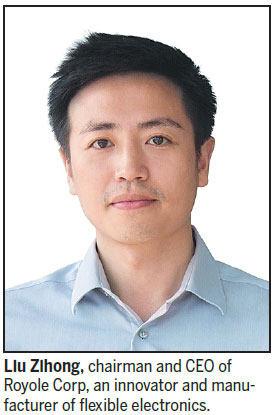Innovation drives new economic growth

Unicorn CEOs' views on how technology will change businesses - and people's lives
A booming digital economy is reshaping China's economic landscape as a string of unicorn companies - startups valued at more than $1 billion - gear up to become new growth engines in the country.
These unicorns, covering a wide range of high-tech sectors including artificial intelligence, internet of things and intelligent manufacturing, have thoroughly changed how people live and are casting new light to invigorate the country's innovation and foster a new economy.

Ai Cheng (center), founder of iAsk Media, and Liu Zihong (right), CEO of Royole Corp, attend the Consumer Electronics Show in Las Vegas, the US, in January. Photos Provided to China Daily
During the two sessions in March of the country's top legislative and political advisory bodies, China called for more intensified efforts to stimulate innovation and pledged to do more to implement the innovation-driven development strategy.
As a collaborative program with iAsk Media, an omnimedia platform founded by Ai Cheng, a renowned journalist and businesswoman, we interviewed CEOs from three unicorns for their views on opportunities and challenges brought about by the country's ongoing progress, as well as their innovative development strategies.They are Dai Wei from Ofo Inc, one of the country's main bike-sharing players; Liu Zhihong from Shenzhen Royal Technology Co Ltd, an innovator and a manufacturer of smart electronics; and Su Hua from Kuaishou, a leading video-sharing and livestreaming platform.
The two sessions this year called for more efforts to support innovative enterprises, especially in IPO and financing. How do you view this policy, and what benefits will it bring to your company?
Dai Wei: As a Chinese company, Ofo hopes to go public in China if possible in order to create more value for the domestic capital market.
As a young tech startup, Ofo has achieved success in the past years thanks to favorable policies and business environment. Like most startups, Ofo is on its way of rapid development and needs to expand financing channels to get more support to bolster our businesses.
The two sessions delivered a good signal for startups like Ofo and revealed that the government has attached great importance to technology innovation. These favorable policies will help us to explore more new advanced technologies in the future.

What is your take on the role of China's internet and technology development in its economic transition? What are the challenges that we may encounter?
Dai Wei: China has embraced rapid internet and technology development, which is significant to our economic transition, especially in improving social efficiency. Big data and artificial intelligence have been written into the government work report, indicating their future significance to industrial integration, economic structure and people's lifestyles.
We say Ofo is a great attempt in applying internet technology to people's lifestyle - their way of daily commuting. In order to enhance its user experience, Ofo has been facilitating our tech innovations, like the first NFC smart lock and big data platform for urban traffic. Going forward, we will continue to develop edgy tech and further explore artificial intelligence and big data.
MOST POPULAR
- 1 China to give visa-free treatment to another 9 countries
- 2 China fully opens manufacturing sector to foreign investors in landmark opening up move
- 3 China's import expo attracts record-breaking participating countries, exhibitors
- 4 China's door opening even wider to foreign visitors, businesses
- 5 China revises rules to ease foreign strategic investment in listed firms
Editors' Picks
 Video:
Peru sees new port open
Video:
Peru sees new port open
 Infographic:
China's public holidays for 2025
Infographic:
China's public holidays for 2025
 Infographic:
Basic facts of APEC
Infographic:
Basic facts of APEC
 Infographic:
Wrapping up the 7th CIIE: Data recap
Infographic:
Wrapping up the 7th CIIE: Data recap



